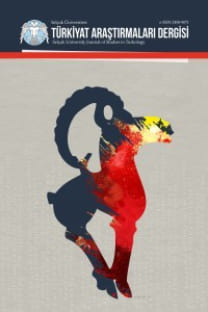İZMİR’İN İŞGALİNİ PROTESTO AMACIYLA İSTANBUL’DA DÜZENLENEN MİTİNGLERİN TÜRK ROMANINDAKİ YANKILARI
İzmir’in işgali Millî Mücadele sürecinin önemli gelişmelerindendir. Birinci Dünya Savaşı’nın yarattığı hezimet, halkta bıkkınlık yaratmış ve cephelerde bulunmaktan soğutmuşken cereyan eden bu hadise, ihtiyaç duyulan kıvılcımı ateşlemiştir. Halk, İzmir işgal edilince, milli iradenin yabancılar eline geçtiğini fark etmiş ve bunu engelleyebilmek adına, eylem zamanının geldiğini görmüştür. Bu nedenle, işgali protesto etmek için düzenlenen mitinglere coşkuyla koşmuştur.
THE REPERCUSSIONS OF THE DEMONSTRATIONS HELD IN ISTANBUL TO PROTEST THE OCCUPATION OF IZMIR IN TURKISH NOVEL
The occupation of Izmir is one of the important developments in Turkey’s National Struggle. The thrashing in the First World War disappointed the people and the defeat that came when people got tired of being in the front line sparked off the fire that was needed. People noticed that the national will had fallen into the wrong hands when Izmir was occupied and understood that it was high time to take action to prevent this from happening. Hence, they enthusiastically participated in the demonstrations held to protest the occupation.The effect of demonstrations on the National Struggle process did not escape Turkish novelists’ notice. However, the analyses that our writers made concerning the demonstrations held in İstanbul to protest the occupation of Izmir escaped the notice of literature reviewers.Aiming to fill this gap, the present study involves some analyses regarding the novel-history relationship. Also, the concept of ‘historical phenomenon’ is also explained in this part. Later, the occupation of İzmir and the historical process of demonstrations held against it are handled. The main aim of the study is to determine to what extent our writers remained loyal to the historical phenomena while describing the demonstrations. In conclusion, it has been found out that our writers’ descriptions coincided with the historical knowledge of the reader.
Keywords:
İzmir, occupatıon, demonstration, novel,
___
- ADIVAR, Halide Edip (2004), Türk’ün Ateşle İmtihanı, İstanbul: Özgür Yayınları.
- ARIBURNU, Kemal (1951), Millî Mücadelede İstanbul Mitingleri, Ankara: Yeni Matbaa.
- ATATÜRK, Mustafa Kemal (1989), Nutuk, Cilt 1, Ankara: Atatürk Kültür, Dil ve Tarih Yüksek Kurumu, Türk Tarih Kurumu Yayınları.
- CARR, Edward Hallett (2003), Tarih Nedir?, İstanbul: İletişim Yayınları.
- COLLİNGWOOD, R.G. (2001), Tarih Felsefesi Üzerine Denemeler, (Çev. Erol Özvar). İstanbul: Ayışığı Kitapları.
- ÇELİK, Yakup (2002), Tarih ve Tarihî Roman Arasındaki İlişki Tarihî Romanda Kişiler. Bilig, S. 22, s. 49-65.
- HOBSBAWM, Eric. (t.y.). Kısa 20. Yüzyıl, (Çev. Yavuz Alagon). Ankara, İstanbul: Sarmal Yayımcılık.
- JENKİNS, Keith (1991), Tarihi Yeniden Düşünmek, Ankara: Dost Kitabevi.
- KAPLAN, Mehmet (2009), Kültür ve Dil, İstanbul: Dergâh Yayınları.
- KAPLAN, Mehmet- vd. (1981), Devrin Yazarlarının Kalemiyle Milli Mücadele ve Gazi Mustafa Kemal, İstanbul: Kültür Bakanlığı Yayınları.
- KARAKIŞLA, Yavuz Selim (2000), Tarih ve Roman İlişkisi Üzerine Açıkoturum. Tarih ve Toplum. C.33, S.198, s.4-15.
- KÖPRÜLÜ, Fuat (1986), Türk Edebiyatı Tarihi, İstanbul: Ötüken Yayınları.
- LUKACS, Gyorgy (2008), Tarihsel Roman, Ankara: Epos Yayınları.
- ORTAYLI, İlber (2005), Tarihin Sınırlarına Yolculuk, İstanbul: Ufuk Kitapları.
- ÖZLEM, Doğan (1984), Tarif Felsefesi, İzmir: Ege Üniversitesi Edebiyat Fakültesi Yayınları.
- TANSEL, Selahattin (1991), Mondros’tan Mudanya’ya Kadar Cilt 1, İstanbul: Millî Eğitim Bakanlığı Yayınları.
- TEKELİ, İlhan (1998), Tarihyazımı Üzerine Düşünmek, Ankara: Dost Kitabevi.
- TÖRENEK, Mehmet (2013), Türk Romanında İşgal İstanbul’u, İstanbul: Kitabevi Yayınları.
- UÇAR, Şahin (1997), Tarih Felsefesi Meseleleri, İstanbul: Nehir Yayınları.
- ISSN: 1300-5766
- Yayın Aralığı: Yılda 3 Sayı
- Başlangıç: 1994
- Yayıncı: Selçuk Üniversitesi
Sayıdaki Diğer Makaleler
ANADOLU BÖLGE VE YÖRE TİPLERİ BAĞLAMINDA EĞİSTELİ/BAĞBAŞI (KONYA) FIKRALARI
SERVET MAHLASLI BİR ŞAİRE MÂL EDİLEN MANZUM HAC SEYÂHATNÂMESİ
KAZAK MİLLÎ ŞAİRİ ABAY (İBRAHİM) KUNANBAYEV’İN PEDAGOJİK GÖRÜŞLERİ ÜZERİNE BİR İNCELEME
İSLAM’DA AKILCILIK GELENEĞİ AÇISINDAN ŞİNASİ’NİN ŞİİRİ
OSMANLI ŞAİRLERİNİN ÇAĞATAY TÜRKÇESİYLE YAZDIKLARI ŞİİRLERDE KULLANDIKLARI DİL ÜZERİNE
AHMET HAMDİ TANPINAR ŞİİRLERİNDE VAROLUŞSAL PROBLEM VE YALNIZLIK
FRANSIZ SEYYAH HOMMAIR’IN SEYAHATNAMESİNDE 19. YÜZYILDA ASTARHAN
